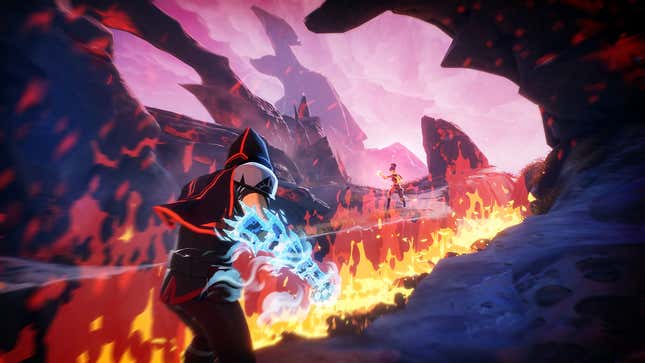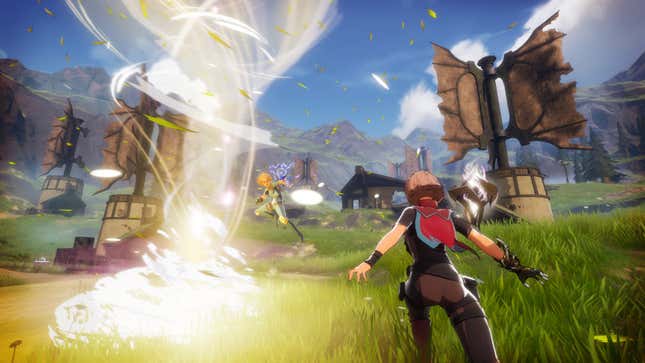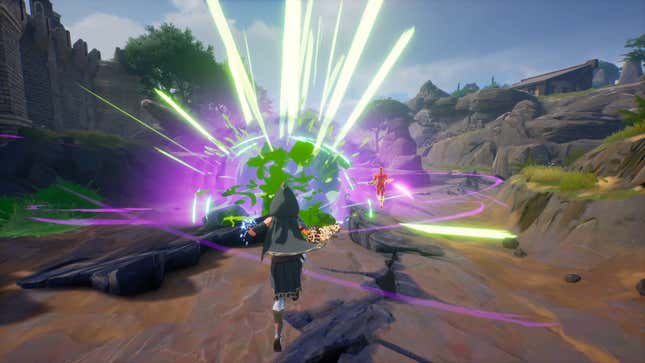
I am, by nature, regrettably competitive. I like winning—big fan of not falling on my face and eating shit, here—but win/lose scenarios fill me with anxiety. Spellbreak sank its hooks into me the moment I realized that it made me stop caring about that. I was in the middle of a wild, multi-person melee. Gouts of flame belched out of rolling rock craters. Poison clouds obscured my vision. Wind sliced at my cheeks. I leaped and soared and dodged, avoiding certain doom by a hair’s breadth. “I don’t care if I die here,” I thought to myself. “This is dope.”
Spellbreak came out on PC, PS4, Xbox One, and Switch last week, and it’s become a minor Twitch hit in the intervening period. It is, structurally, a battle royale. 42 players descend onto a giant map. A circle slowly encroaches and forces players into closer quarters. Last person (or team) standing wins.
Combat, though, immediately elevates this one. Spellbreak contains no guns or other weapons—only elemental magic. Players begin each match with one of six different elemental gauntlets: fire, ice, lightning, stone, poison, or air. These unleash two abilities each, typically some kind of rangy, repeatable blast and a larger attack with more area-of-effect potential. Players can find and equip a second gauntlet after they’ve dropped onto the map. Magic can be leveled up as matches progress. Casting spells is nearly-instantaneous and feels less like magic in other games and more like the punchy blows delivered in Avatar: The Last Airbender.
Fights in Spellbreak don’t flow with the same martial grace, but thanks to a suite of mobility skills (one of which is just straight up Aang’s spinny airbending leap from Avatar), they’re high-flying nail-biters. If you’re an Overwatch player, it’s like everybody’s Pharah, but scrappier and with more survivability. In other battle royales, I find myself selectively engaging so as to up my chances of survival. In Spellbreak, I seek out foes, whether I like my chances against them or not, because combat just feels so good.
Things get especially fun when you add multiple people to the mix. Elements combine, so if an opponent manages to, say, avoid your toxic cloud, you can cast fire into it to make a toxic explosion. If you don’t have a fire gauntlet equipped at the time, that’s what friends—or especially reckless enemies—are for. Earlier today, I faced off against somebody wielding wind, and my fire spells got caught up in their swirling sand tornado ability. The tornado yanked me into its fiery orbit, and I thought I was done for, but I also refused to be hoisted by a combination of my own petard and somebody else’s petard. I timed my final, desperate blast just as I completed a full loop inside the tornado, which in turn propelled me in the general direction of my opponent. I scored a direct hit and they dropped dead. “Dope,” I said. This game makes me say “dope” a lot.
For a game whose combat is so self-evidently excellent, Spellbreak’s map is weirdly large, which means it can sometimes be difficult to find enemies during a match’s early goings, or even middle and late portions. Granted, combat is also a screen-filling spectacle, so if anybody is fighting, you’re probably gonna be able to hear and see it from hundreds of feet away. This approach to space, combined with spells’ general flashiness, means that it’s rare for somebody to completely get the drop on you. As somebody who gets frustrated when I’m suddenly and inexplicably zapped out of existence in other battle royales, I appreciate this. I’ve died a lot in Spellbreak, but I’ve pretty much always been able to calculate how I screwed up, and it wasn’t “standing in the wrong place for two seconds too long.”

Even though combat is fast-paced and frequently airborne, it’s also less rooted in fast-twitch aiming skills and more about split-second tactical decision-making. The fire gauntlet’s two abilities are a good example. The first is a straightforward fire blast with a slight area-of-effect radius. The second is a towering flame wall. Initially, most of my engagements involved me frantically hurling flame and praying that something landed. After a few matches, I settled into the rhythm of combat and started getting craftier, using the flame wall to block opponents’ exits so they either had to walk into my fire blast’s AOE range or take damage from the wall. Recently, against an extremely game opponent who basically had me dead to rights for our entire fight, I scored a posthumous kill with this strategy. I actually, physically clapped when this happened.
There is a bit of a learning curve to mixing and matching abilities, but once you start to get a feel for 1v1 encounters, multi-foe fights become an absolute blast. Spells fly every which way, but the general distance at which combat occurs and the aforementioned abundance of mobility skills makes it all remarkably manageable. Even with chaos unfolding on all sides, you can plan.

I fully intend on playing a lot more Spellbreak this week, but I do have concerns about its long-term appeal. Right now there’s a progression system for both your character and each gauntlet, but unlockable cosmetics lack flare. While talents you earn as you level up change your capabilities slightly—for example, I recently unlocked one that allows me to sometimes resurrect upon death, which is pretty powerful!—they don’t strike me as impactful enough to hold up an entire progression system. In the future, developer Proletariat Inc plans to add a “Chapters” system that’ll dole out bits of story and special rewards, but that option is grayed out for now.
For the most part, I’m glad that Proletariat focused on getting Spellbreak’s fundamentals right before slapping on genre-standard bells and whistles. The game’s combat is so good that it could easily form the backbone of a more traditional deathmatch shooter, a single-player action-adventure game, or any number of other genres. Something that sublime doesn’t come together without a lot of focus, iteration, and refinement. Now, however, Spellbreak is going to have to hold onto its player base until surrounding systems are in equally good shape. Battle royale fans are certainly not starved for options, so here’s hoping they appreciate transcendent combat enough to stick around for the long haul.